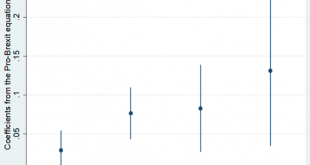I give an account below of Keynes life in 1931.January–May 1931 On 27 January 1931, Friedrich Hayek arrived in London at the London School of Economics (LSE). Hayek gave four evening lectures at 5 p.m. from 27 to 30 January 1931 on “Prices and Production” (Howson 2011: 196), and these lectures were later published in England as the book Prices and Production (September 1931), an exposition of the Austrian Business Cycle Theory (ABCT). Hayek himself had returned to Austria by 14 February...
Read More »Keynes’ Life: 1930
I give an account below of Keynes life in 1930, the second year of the Great Depression.January–May 1930 In January 1930, the second Hague Conference adopted the Young Plan on German reparations, and, as we saw in the last post, Keynes had corresponded with the leading members on the issue of German reparations. By early 1930, Keynes was beginning to think that an international slump was a possibility (Moggridge 1992: 483).On 19 January 1930, Keynes’ friend Frank Plumpton Ramsey died after...
Read More »Keynes’ Life: 1929
I give an account below of Keynes life in 1929, the year in which the Great Depression began.January–May 1929 Keynes taught at Cambridge in the first half of the year. The teaching periods at Cambridge were divided into three terms:October–December – Michaelmas January–March – Lent or January term April–June – Easter term.On 18 January 1929, Ludwig Wittgenstein returned to Cambridge, and Keynes met him when he arrived, and allowed Wittgenstein to share his rooms at Cambridge until February...
Read More »Gideon Polya — Britain Robbed India Of $45 Trillion & Thence 1.8 Billion Indians Died From Deprivation
Eminent Indian economist Professor Utsa Patnaik (Jawaharlal Nehru University) has estimated that Britain robbed India of $45 trillion between 1765 and 1938, However it is estimated that if India had remained free with 24% of world GDP as in 1700 then its cumulative GDP would have been $232 trillion greater (1700-2003) and $44 trillion greater (1700-1950). Deprivation kills and it is estimated that 1.8 billion Indians died avoidably from egregious deprivation under the British (1757-1947)....
Read More »Brexit was a cry of financial pain and not the influence of the old
Originally published on 17 October 2017 at Vox By Federica Liberini, Andrew Oswald, Eugenio Proto, Michela Redoano There is a very wide debate on the determinants of the vote by British citizens to leave the EU. In particular, the idea that this vote reflects discontent and disillusionment has been widely discussed in the UK and European media. Furthermore, large numbers of newspaper and TV...
Read More »Britain’s Protectionism against Indian Cotton Textiles
From the late 17th century, Indian cotton textile imports – such as white calicoes, muslins, printed and striped cotton goods – flowed into Europe in ever larger volumes.Local manufacturers, seeing the lightness and superior nature of cotton, started to create new cotton textile industries.But they faced a serious problem: they could not compete with the Indian imports in terms of price or even quality (Parthasarathi 2011: 89). The centre of the world’s cotton textile production was in India...
Read More »Britain should abandon the Neoliberal Train Wreck that is the EU
As should other countries: it’s plain common sense.The EU and Eurozone are catastrophic. Of course, sanity prevailed and the UK never joined the Eurozone, but the EU itself is still catastrophic.Britain should leave the EU as quickly as possible, for the following reasons: (1) to protect the UK’s economic and political sovereignty;(2) to protect its democracy;(3) to protect its welfare state and social services;(4) to have some hope for a Post Keynesian-style or MMT-style economic policy in...
Read More »Britain, Brexit, and sovereignty
In-depth analysis on Credit Writedowns Pro. You are here: Political Economy » Britain, Brexit, and sovereignty By Marc Chandler originally posted at Marc’s blog, Marc to Market As the European Union grew, the unanimity in decision-making increasingly gave way to qualified majority voting. This development took away an important weapon the UK deployed to pursue its national interest. It use often to frustrate the collectivist decision-making in Brussels and...
Read More »On the Dehumanization of Immigrants
Britain is in the grip of a worrying trend. Our own Prime Minister compared migrants in Calais to insects when he called them a “swarm”. Meanwhile, internet comment sections relating to the refugees are filled with hatred and venom. Asylum seekers are referred to as “invaders”, and the trolls encourage the British authorities to shoot them, to machine gun them, and hang them on meat hooks. This dehumanization of immigrants frightens me. Not simply because dehumanization of large groups of...
Read More » Heterodox
Heterodox


